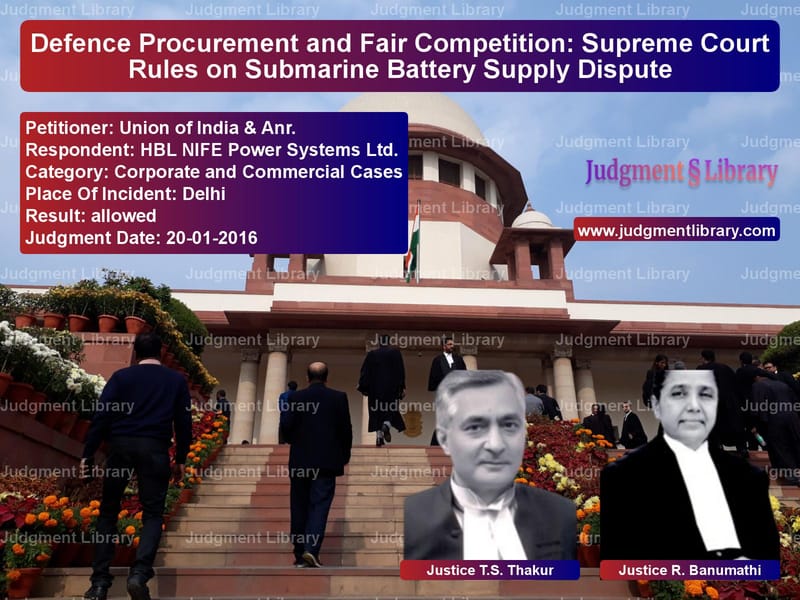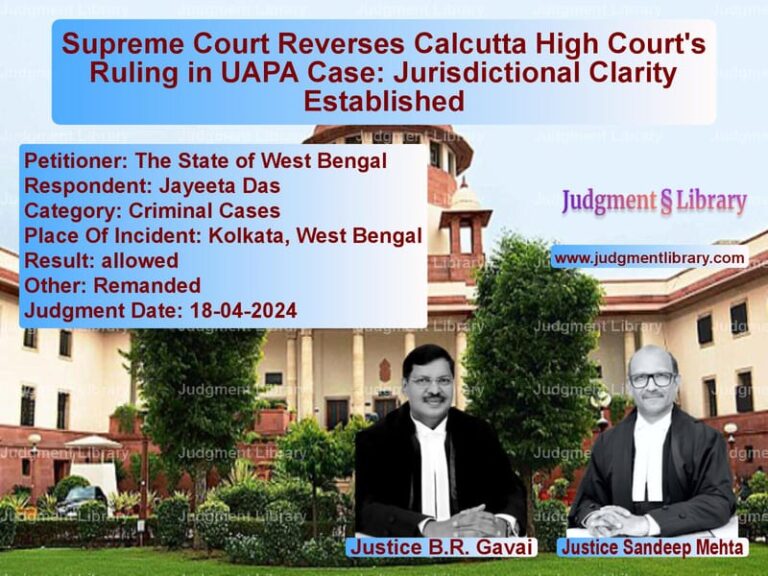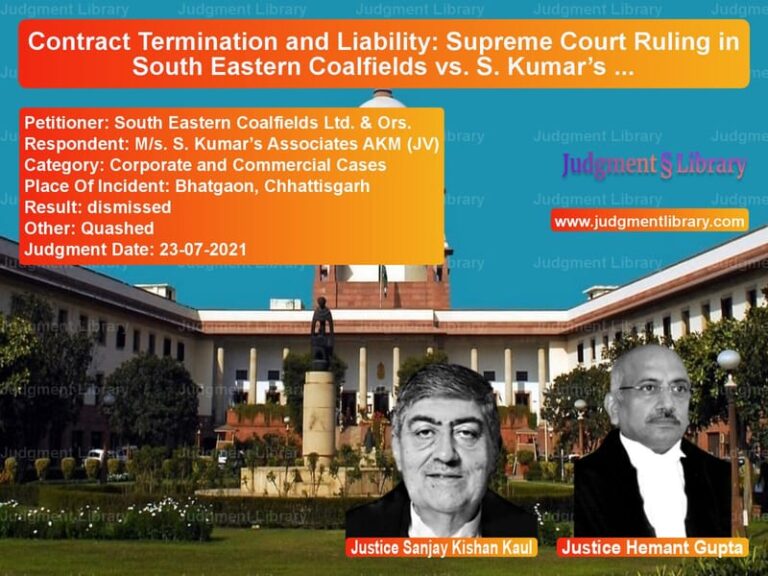Defence Procurement and Fair Competition: Supreme Court Rules on Submarine Battery Supply Dispute
The Supreme Court of India delivered its judgment in Civil Appeal No. 3193 of 2006, addressing a long-standing dispute between Union of India and HBL NIFE Power Systems Ltd. regarding the procurement of submarine batteries for the Indian Navy. The case focused on the government’s procurement policies for critical defence equipment and whether competition should be allowed in a field requiring high technical standards and reliability.
Background of the Case
India’s submarine batteries are essential components used in different types of submarines. The Indian Navy uses three different classes of submarines, each requiring specialized batteries:
- Type-I: Used in EKM submarines
- Type-II: Used in SSK class submarines
- Type-III: Used in Foxtrot class submarines
Originally, these batteries were imported, but over time, the government sought to indigenize production. M/s Standard Batteries Ltd. was developed as an indigenous manufacturer for Type-III batteries, later expanding to Type-I. M/s Exide Industries Ltd. was assigned Type-II batteries, and in 1998, Exide acquired Standard Batteries Ltd., making it the sole supplier for all submarine batteries in India.
HBL NIFE’s Claim
In 2004, HBL NIFE Power Systems Ltd. claimed that it had developed submarine batteries and sought registration as an alternative supplier. The company requested a development order, agreeing to undergo stringent testing to prove its capabilities. However, the Ministry of Defence decided to continue procuring from Exide Industries Ltd., which was the only supplier certified by the Director General of Quality Assurance (DGQA).
Legal Battle in the High Court
HBL NIFE filed a writ petition in the Delhi High Court in September 2005, arguing that the government’s refusal to consider its products violated Article 14 of the Indian Constitution (Right to Equality). It argued that:
- The government’s decision to procure exclusively from Exide created a monopoly.
- Its submarine batteries were developed under internal evaluation and met necessary standards.
- Competition should be allowed to ensure better quality and pricing.
The High Court ruled in favor of HBL NIFE on October 27, 2005, directing the government to issue an advertisement inviting open tenders for submarine batteries.
Arguments in the Supreme Court
The government challenged the High Court’s ruling, arguing that:
- Submarine batteries are a critical defence component requiring extreme reliability.
- Development of such equipment must be conducted under strict supervision.
- DGQA oversight was essential to ensure quality and performance.
- HBL NIFE’s batteries had not been tested through the required process.
HBL NIFE countered that:
- It had invested heavily in developing submarine batteries since 1999.
- It had been provided technical specifications by the government in 1999.
- Its products were available for testing as early as 2004, but the government refused to conduct trials.
- Competition in procurement would prevent an unfair monopoly.
Supreme Court’s Ruling
After reviewing the facts, the Supreme Court ruled in favor of the government, stating:
“The government cannot put the lives of its defence personnel and submarines worth crores of rupees at risk simply because a company claims to have the capability.”
The Court emphasized that:
- Defence procurement must follow stringent guidelines.
- Open tenders are suitable for common-use items but not for mission-critical defence components.
- The development process for submarine batteries must be supervised by DGQA.
- HBL NIFE had not completed the full testing and evaluation process.
Consequently, the Court set aside the High Court’s ruling and allowed the government to continue procurement without open tenders.
Key Takeaways from the Judgment
- Defence procurement must balance competition with reliability: While competition is beneficial, it cannot come at the cost of national security.
- Strict quality control is essential: The Court reinforced the role of DGQA in ensuring that critical components meet required standards.
- Government has discretion in procurement: The ruling clarified that courts should not interfere in specialized defence procurements.
Conclusion
This judgment is significant as it upholds the government’s right to procure defence equipment based on strict quality considerations rather than open market competition. While competition in procurement is encouraged, it must not compromise the reliability of essential military supplies.
Don’t miss out on the full details! Download the complete judgment in PDF format below and gain valuable insights instantly!
Download Judgment: Union of India & Anr vs HBL NIFE Power Syste Supreme Court of India Judgment Dated 20-01-2016.pdf
Direct Downlaod Judgment: Direct downlaod this Judgment
See all petitions in Corporate Governance
See all petitions in Judgment by T.S. Thakur
See all petitions in Judgment by R. Banumathi
See all petitions in allowed
See all petitions in supreme court of India judgments January 2016
See all petitions in 2016 judgments
See all posts in Corporate and Commercial Cases Category
See all allowed petitions in Corporate and Commercial Cases Category
See all Dismissed petitions in Corporate and Commercial Cases Category
See all partially allowed petitions in Corporate and Commercial Cases Category







